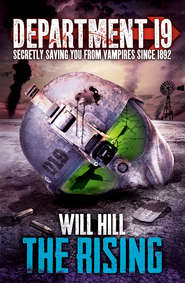По всем вопросам обращайтесь на: info@litportal.ru
(©) 2003-2024.
✖
The Department 19 Files: The New Blood: 1919
Настройки чтения
Размер шрифта
Высота строк
Поля
The Department 19 Files: The New Blood: 1919
Will Hill
A short story from the world of Department 19.In 1891, Abraham Van Helsing and a group of friends faced Dracula, the world’s first vampire – and won. The survivors of that battle founded Department 19, and have been secretly saving the world ever since. A highly classified archive exists recording every act of bravery in that time.That archive is now open. These are the Department 19 files.London, 1919.Safely returned from the killing fields of Europe, Quincey Harker is bored and restless, his mind full of the terrible things he has seen, things he cannot seem to forget. So when his father invites him to hear a proposition from him and his friends, Quincey is hopeful that a new project may be just the thing to take his mind off the monsters he encountered, terrible creatures that flew above the ground and killed without mercy. He has no idea quite how wrong he is…
THE DEPARTMENT 19 FILES
THE NEW BLOOD: 1919
Will Hill
Contents
HAMPSTEAD, LONDON: 6th JANUARY 1919 (#ulink_283fa2e9-6e4a-5549-8877-41d1d0745cb2)
Copyright (#litres_trial_promo)
About the Publisher
In 1891, Abraham Van Helsing and a small number of his friends faced Dracula, the world’s first vampire. They chased him across Europe, to the mountains of Transylvania, and the castle that bore his name. Not all of them returned — but Dracula was destroyed.
Other vampires remained, though, and so in 1892 Van Helsing and the other survivors were asked by Prime Minister William Gladstone to found the Department of Supernatural Investigation.
The Department, which was originally based in a townhouse in Piccadilly, was charged with protecting the British Empire from the growing threat of the supernatural.
Over the course of the twentieth century, the men and women of Department 19, as it became known, fought in every corner of the globe, holding back the rising tide of darkness, often at enormous personal cost.
In a top-secret location, there stands a highly classified archive that records the long history of humanity’s war with the supernatural. The papers within it list the names of every man and woman lost in the line of duty, and contain detailed accounts of every act of bravery.
Beyond the men and women of the Department, these are accessible only by the Prime Minister and the Chief of the General Staff.
These are the Department 19 files.
HAMPSTEAD, LONDON 6th JANUARY 1919 (#ulink_b1eb286c-3e72-567e-ad63-c11e81a05d3e)
On the day that the course of his life changed forever, Captain Quincey Harker was sitting in his father’s study thinking about his friends, both living and dead.
After a week’s official rest and relaxation in Rome that had proved to be anything but restful or relaxing, Harker and the four members of his Special Reconnaissance Unit had made their way back to Britain aboard an ocean liner that had been converted into a troopship: her portholes blocked, her towering black and white hull painted grey, 12-pound and 4.7-inch guns bolted to her decks. They had spent Christmas Day somewhere in the southern Atlantic, steaming towards Southampton, and had toasted their fallen comrade, the man who was occupying Harker’s thoughts once again.
Quincey had been taken to London in his father’s Ford, after bidding farewell to his squad mates on the bustling dock, and immediately thrown headlong into a welcome-home dinner for which he had no appetite for whatsoever. He smiled his way through it, acknowledging each new toast with as much gratitude as he could muster, and excused himself as soon as it was appropriate to do so. The following morning he caught a train to Winchester, and knocked on the door of the house where Andrew Thorpe’s parents lived.
Their faces had crumpled with grief at the sight of him, but they had welcomed him in with a frenzy of hugs and tears. He had known them since he was twelve, since the first time he had accompanied his friend home from Eton for the weekend and found a generous warmth of hospitality entirely at odds with the reserved quiet of his parents’ home. The Thorpes’ house was always loud, and warm, and smelt wonderful; Elizabeth Thorpe’s dangerously moreish cakes and biscuits had been what had prompted her son to try out for the Eton football team, for fear of his waistline expanding further, where he and Harker had met for the very first time.
As Elizabeth busied herself in the kitchen, Harker joined Martin Thorpe in the living room. A small Christmas tree stood in one corner, decorated with silver balls and loops of gold tinsel. Two strings of cards hung either side of the fireplace and sprigs of holly lay on the mantelpiece, surrounding a black and white photograph of Lieutenant Andrew Thorpe.
“It’s good to see you, Quincey,” said Martin. “We prayed every day for you to be safe. Especially after…” The words died away and the older man’s eyes filled with tears.
“Thank you, sir,” said Harker, feeling a lump in his throat. “How are you holding up?”
“One has to get on,” said Thorpe. “Liz has been keeping busy, but then she always did, as you know. He’s been gone more than a year already, can you believe that?”
Harker nodded.
“The anniversary was a hard day, no two ways about it,” continued Thorpe. “But at least we have a gravestone to visit. So many families had nothing to bury, but we were able to say goodbye to him. I want to thank you for that, Quincey. For not leaving him behind. It meant the world to his mother and me.”
“He’d have done the same for me,” managed Harker, his heart heavy in his chest.
Martin Thorpe nodded. “He would. He loved you like a brother.”
“The feeling was mutual,” said Harker. “I’m so sorry I couldn’t bring him home to you safely. I’d give anything to change that.”
Thorpe smiled weakly at him. “We know that, Quincey. There wasn’t much left of his letters after the censors had done with them, but he told us how you looked after him and the rest of your men. We know you did everything you could.”
“I tried,” said Harker, feeling tears rise in the corners of his eyes. “My very hardest. I wish it had been enough.”
“Who’s for tea?” asked Liz Thorpe, bustling into the living room and putting a groaning tray of crockery and biscuits on to the low table before the fire. “Quincey, you’ll stay the night, yes? I’ve already made up the back bedroom.”
Harker smiled. He had stayed in the back bedroom of the Thorpes’ home more times than he could remember, but the room would always remind him of his childhood, of the times that he and Andrew had read ghost stories by candlelight, had sneaked milk and biscuits upstairs and ate and drank in nervous silence, listening for the sounds of footsteps in the hall, trying their hardest not to giggle at the sheer recklessness of their rule-breaking.
“I’d love to,” he said. “Thank you.”
“Don’t be silly,” said Mrs Thorpe. “I’m sorry about the biscuits, but sugar and butter are harder to get hold of than gold these days. I’ll just fetch the sandwiches.”
She hurried back out of the living room, leaving him alone with his friend’s father again. Martin Thorpe managed an unconvincing smile, then dropped his eyes.
“Was he brave?” he asked, his voice little more than a whisper. “My boy. Did he do his duty?”
“Yes, sir,” said Quincey Harker. “He did his duty.”
There was nothing more to say.
Three days later Harker had seen in the year 1919 in the grand ballroom of Arthur Holmwood’s country house as a string quartet urged men and women across the dance floor, and voices and laughter filled the air. The party felt like a communal outpouring of jubilation, of relief at having emerged more or less intact from the long years of horror. Quincey found the joyous display sickening, an insult to the millions of men and women who had not come home, who were lying dead in the cold mud of western Europe instead of drinking champagne and singing ’Auld Lang Syne’, but he kept his mouth shut; everyone was so pleased to see him, so happy that he had returned home safely, and he didn’t want to throw their kindness back at them, undeserved though it was.
Luck, he thought to himself, as a waiter refilled his glass. That’s all it is. The coin lands the other way up and Thorpe is commiserating with my parents. Blind luck.
He had sent telegrams that morning to the remaining members of the Special Reconnaissance Unit, wishing them all a happy new year. What he had left out of the messages was the truth: that he would rather be with any of them than where he found himself: with Kavanagh in Somerset, McDonald in the eastern Highlands of Scotland, Ellis in his small village outside Durham, or with Potts on the edge of the Norfolk Broads.
Anything would be better than this. Anything.
“You shouldn’t think so hard,” said a voice Harker knew well. “It’s bad for the brain.”
Quincey smiled, and turned round. Standing in front of him was a man he had known his entire life and another he had come to feel as if he always had.
Albert Holmwood, the future Lord Godalming, was the spitting image of his father; he possessed the same high cheekbones, the delicate, almost feminine features, the piercing pale green eyes. He was almost a year older than Quincey, but the age gap had never been an issue, even as they went their separate ways through life. Albert had gone to Charterhouse, as his father and grandfather had before him, while Quincey went to Eton, but whenever the two of them returned to London during the school holidays, they were able to slip back into their friendship as though they had never been apart. For the majority of his life, Albert had been lazy and dissolute, and the few arguments the two men had ever had had largely been centred round Quincey’s frustration at his friend’s apparent unwillingness to use the intelligence he possessed in such abundance.
Scandal had followed Albert everywhere, culminating in an incident that had sent whispered shockwaves through the dining rooms of London society. In 1909, when he was barely sixteen years old, Albert had impregnated Lady Jane Lindley, the only daughter of one of the oldest and proudest families in the country, creating a crisis that had taken every last bit of Arthur Holmwood’s legendary diplomacy and, it was rumoured, a sizeable chunk of his fortune to defuse. Word had reached Quincey’s ear that Lord Godalming had come within a hair’s breadth of disowning his son, but had been talked out of it by his friends, Quincey’s father included. Instead, the shame had hung round the neck of the Holmwood family for almost five years, until the spring of 1914, when Albert turned twenty-one, and something strange happened.
Almost overnight, he changed; the boy who appeared incapable of taking anything seriously disappeared, replaced by a young man who, in quick succession, married Jane Lindley, became a doting father to Alexandra, five years old at the time, and took a position in the War Office, where he remained to this day. Quincey could see Jane in the distance, twirling the now alarmingly grown-up Alexandra across the dance floor as the girl’s grandfather watched in open delight.
Standing beside him was a man whose upbringing and circumstances had been as different as could be imagined from the future Lord Godalming’s, but whom Albert Holmwood now referred to both privately and publicly as his brother. David Morris was born in 1892, the product of a brief liaison between Quincey Morris, the larger-than-life American after whom Quincey Harker was named, and a prostitute by the name of Jenny Lincoln. After David’s birth, she had dragged herself free, with the help of Arthur Holmwood, of the lifestyle that she had sunk into as a teenager. He had found her work as a kitchen maid in a respectable house in Kensington, and asked her to send her son to see him when he turned eighteen.
Will Hill
A short story from the world of Department 19.In 1891, Abraham Van Helsing and a group of friends faced Dracula, the world’s first vampire – and won. The survivors of that battle founded Department 19, and have been secretly saving the world ever since. A highly classified archive exists recording every act of bravery in that time.That archive is now open. These are the Department 19 files.London, 1919.Safely returned from the killing fields of Europe, Quincey Harker is bored and restless, his mind full of the terrible things he has seen, things he cannot seem to forget. So when his father invites him to hear a proposition from him and his friends, Quincey is hopeful that a new project may be just the thing to take his mind off the monsters he encountered, terrible creatures that flew above the ground and killed without mercy. He has no idea quite how wrong he is…
THE DEPARTMENT 19 FILES
THE NEW BLOOD: 1919
Will Hill
Contents
HAMPSTEAD, LONDON: 6th JANUARY 1919 (#ulink_283fa2e9-6e4a-5549-8877-41d1d0745cb2)
Copyright (#litres_trial_promo)
About the Publisher
In 1891, Abraham Van Helsing and a small number of his friends faced Dracula, the world’s first vampire. They chased him across Europe, to the mountains of Transylvania, and the castle that bore his name. Not all of them returned — but Dracula was destroyed.
Other vampires remained, though, and so in 1892 Van Helsing and the other survivors were asked by Prime Minister William Gladstone to found the Department of Supernatural Investigation.
The Department, which was originally based in a townhouse in Piccadilly, was charged with protecting the British Empire from the growing threat of the supernatural.
Over the course of the twentieth century, the men and women of Department 19, as it became known, fought in every corner of the globe, holding back the rising tide of darkness, often at enormous personal cost.
In a top-secret location, there stands a highly classified archive that records the long history of humanity’s war with the supernatural. The papers within it list the names of every man and woman lost in the line of duty, and contain detailed accounts of every act of bravery.
Beyond the men and women of the Department, these are accessible only by the Prime Minister and the Chief of the General Staff.
These are the Department 19 files.
HAMPSTEAD, LONDON 6th JANUARY 1919 (#ulink_b1eb286c-3e72-567e-ad63-c11e81a05d3e)
On the day that the course of his life changed forever, Captain Quincey Harker was sitting in his father’s study thinking about his friends, both living and dead.
After a week’s official rest and relaxation in Rome that had proved to be anything but restful or relaxing, Harker and the four members of his Special Reconnaissance Unit had made their way back to Britain aboard an ocean liner that had been converted into a troopship: her portholes blocked, her towering black and white hull painted grey, 12-pound and 4.7-inch guns bolted to her decks. They had spent Christmas Day somewhere in the southern Atlantic, steaming towards Southampton, and had toasted their fallen comrade, the man who was occupying Harker’s thoughts once again.
Quincey had been taken to London in his father’s Ford, after bidding farewell to his squad mates on the bustling dock, and immediately thrown headlong into a welcome-home dinner for which he had no appetite for whatsoever. He smiled his way through it, acknowledging each new toast with as much gratitude as he could muster, and excused himself as soon as it was appropriate to do so. The following morning he caught a train to Winchester, and knocked on the door of the house where Andrew Thorpe’s parents lived.
Their faces had crumpled with grief at the sight of him, but they had welcomed him in with a frenzy of hugs and tears. He had known them since he was twelve, since the first time he had accompanied his friend home from Eton for the weekend and found a generous warmth of hospitality entirely at odds with the reserved quiet of his parents’ home. The Thorpes’ house was always loud, and warm, and smelt wonderful; Elizabeth Thorpe’s dangerously moreish cakes and biscuits had been what had prompted her son to try out for the Eton football team, for fear of his waistline expanding further, where he and Harker had met for the very first time.
As Elizabeth busied herself in the kitchen, Harker joined Martin Thorpe in the living room. A small Christmas tree stood in one corner, decorated with silver balls and loops of gold tinsel. Two strings of cards hung either side of the fireplace and sprigs of holly lay on the mantelpiece, surrounding a black and white photograph of Lieutenant Andrew Thorpe.
“It’s good to see you, Quincey,” said Martin. “We prayed every day for you to be safe. Especially after…” The words died away and the older man’s eyes filled with tears.
“Thank you, sir,” said Harker, feeling a lump in his throat. “How are you holding up?”
“One has to get on,” said Thorpe. “Liz has been keeping busy, but then she always did, as you know. He’s been gone more than a year already, can you believe that?”
Harker nodded.
“The anniversary was a hard day, no two ways about it,” continued Thorpe. “But at least we have a gravestone to visit. So many families had nothing to bury, but we were able to say goodbye to him. I want to thank you for that, Quincey. For not leaving him behind. It meant the world to his mother and me.”
“He’d have done the same for me,” managed Harker, his heart heavy in his chest.
Martin Thorpe nodded. “He would. He loved you like a brother.”
“The feeling was mutual,” said Harker. “I’m so sorry I couldn’t bring him home to you safely. I’d give anything to change that.”
Thorpe smiled weakly at him. “We know that, Quincey. There wasn’t much left of his letters after the censors had done with them, but he told us how you looked after him and the rest of your men. We know you did everything you could.”
“I tried,” said Harker, feeling tears rise in the corners of his eyes. “My very hardest. I wish it had been enough.”
“Who’s for tea?” asked Liz Thorpe, bustling into the living room and putting a groaning tray of crockery and biscuits on to the low table before the fire. “Quincey, you’ll stay the night, yes? I’ve already made up the back bedroom.”
Harker smiled. He had stayed in the back bedroom of the Thorpes’ home more times than he could remember, but the room would always remind him of his childhood, of the times that he and Andrew had read ghost stories by candlelight, had sneaked milk and biscuits upstairs and ate and drank in nervous silence, listening for the sounds of footsteps in the hall, trying their hardest not to giggle at the sheer recklessness of their rule-breaking.
“I’d love to,” he said. “Thank you.”
“Don’t be silly,” said Mrs Thorpe. “I’m sorry about the biscuits, but sugar and butter are harder to get hold of than gold these days. I’ll just fetch the sandwiches.”
She hurried back out of the living room, leaving him alone with his friend’s father again. Martin Thorpe managed an unconvincing smile, then dropped his eyes.
“Was he brave?” he asked, his voice little more than a whisper. “My boy. Did he do his duty?”
“Yes, sir,” said Quincey Harker. “He did his duty.”
There was nothing more to say.
Three days later Harker had seen in the year 1919 in the grand ballroom of Arthur Holmwood’s country house as a string quartet urged men and women across the dance floor, and voices and laughter filled the air. The party felt like a communal outpouring of jubilation, of relief at having emerged more or less intact from the long years of horror. Quincey found the joyous display sickening, an insult to the millions of men and women who had not come home, who were lying dead in the cold mud of western Europe instead of drinking champagne and singing ’Auld Lang Syne’, but he kept his mouth shut; everyone was so pleased to see him, so happy that he had returned home safely, and he didn’t want to throw their kindness back at them, undeserved though it was.
Luck, he thought to himself, as a waiter refilled his glass. That’s all it is. The coin lands the other way up and Thorpe is commiserating with my parents. Blind luck.
He had sent telegrams that morning to the remaining members of the Special Reconnaissance Unit, wishing them all a happy new year. What he had left out of the messages was the truth: that he would rather be with any of them than where he found himself: with Kavanagh in Somerset, McDonald in the eastern Highlands of Scotland, Ellis in his small village outside Durham, or with Potts on the edge of the Norfolk Broads.
Anything would be better than this. Anything.
“You shouldn’t think so hard,” said a voice Harker knew well. “It’s bad for the brain.”
Quincey smiled, and turned round. Standing in front of him was a man he had known his entire life and another he had come to feel as if he always had.
Albert Holmwood, the future Lord Godalming, was the spitting image of his father; he possessed the same high cheekbones, the delicate, almost feminine features, the piercing pale green eyes. He was almost a year older than Quincey, but the age gap had never been an issue, even as they went their separate ways through life. Albert had gone to Charterhouse, as his father and grandfather had before him, while Quincey went to Eton, but whenever the two of them returned to London during the school holidays, they were able to slip back into their friendship as though they had never been apart. For the majority of his life, Albert had been lazy and dissolute, and the few arguments the two men had ever had had largely been centred round Quincey’s frustration at his friend’s apparent unwillingness to use the intelligence he possessed in such abundance.
Scandal had followed Albert everywhere, culminating in an incident that had sent whispered shockwaves through the dining rooms of London society. In 1909, when he was barely sixteen years old, Albert had impregnated Lady Jane Lindley, the only daughter of one of the oldest and proudest families in the country, creating a crisis that had taken every last bit of Arthur Holmwood’s legendary diplomacy and, it was rumoured, a sizeable chunk of his fortune to defuse. Word had reached Quincey’s ear that Lord Godalming had come within a hair’s breadth of disowning his son, but had been talked out of it by his friends, Quincey’s father included. Instead, the shame had hung round the neck of the Holmwood family for almost five years, until the spring of 1914, when Albert turned twenty-one, and something strange happened.
Almost overnight, he changed; the boy who appeared incapable of taking anything seriously disappeared, replaced by a young man who, in quick succession, married Jane Lindley, became a doting father to Alexandra, five years old at the time, and took a position in the War Office, where he remained to this day. Quincey could see Jane in the distance, twirling the now alarmingly grown-up Alexandra across the dance floor as the girl’s grandfather watched in open delight.
Standing beside him was a man whose upbringing and circumstances had been as different as could be imagined from the future Lord Godalming’s, but whom Albert Holmwood now referred to both privately and publicly as his brother. David Morris was born in 1892, the product of a brief liaison between Quincey Morris, the larger-than-life American after whom Quincey Harker was named, and a prostitute by the name of Jenny Lincoln. After David’s birth, she had dragged herself free, with the help of Arthur Holmwood, of the lifestyle that she had sunk into as a teenager. He had found her work as a kitchen maid in a respectable house in Kensington, and asked her to send her son to see him when he turned eighteen.











